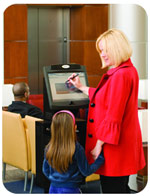NCR to launch patient kiosks in Europe
- 19 May 2008
 |
A new touch-screen kiosk is to be launched in Europe by self-service specialist NCR, designed to simplify the checking in and out procedures for patients.
MediKiosk, a self-service machine which interfaces with hospital information systems and collects clinical information from patients prior to an appointment, is to be piloted by an NHS foundation trust, and one GP practice in England later this year.
The NHS trust will be the first European site to use the technology, with further pilots anticipated in Germany shortly afterwards.
The aim of the kiosk is to simplify registration for GP or hospital appointments for patients prior to their appointment. If payment needs to be made, this can also be collected by the machine.
Speaking at the NCR 2008 Self-Service Universe Executive Conference in Budapest, NCR healthcare specialist Warwick Lawson-Syer told E-Health Europe: “Registering at hospitals or clinics is very frustrating for patients. It often involves a lot of paper forms with a lot of repetition. What this enables is a patient to come in, check-in for their appointment, and complete just one registration form verifying their demographic information and detailing their condition using body map issues or by touching buttons on the screen which match their symptoms.”
Originally launched in the US by healthcare self-service specialist Galvanon in 2002, NCR hope the European market will make similar use of the technology to reduce administrative burdens, and allow more time to be spent on more important matters.
Lawson-Syer added: “The great thing about MediKiosk is that it has been tried and tested successfully in the US so we know that it is useful and effective to healthcare organisations. We have worked very closely with US health bodies to ensure we take into account all issues of consent, privacy and confidentiality. We have also established a good solid interface capable of interfacing with practically any system.
“As we move into Europe, we have held high level talks with specialised integration specialists to ensure that we can interface with the e-health initiatives underway. In
The kiosks are available in three formats – freestanding in healthcare settings, on desktops, or on a wireless clipboard which patients can use in privacy if they prefer.
Data is not held in the kiosk, but transmitted to the system which it is interfacing with, and any information edited is made visible to administration staff for verification.
The CVM Enterprise Server transmitting the information also allows for information to be sent to patients via text messaging or web access. Secured using a randomly selected password, users can log in and confirm their attendance for an appointment or schedule a new appointment.
NCR’s chairman and CEO, Bill Nuti, told EHE: “Healthcare organisations spend too much time on administrative duties and not enough on healthcare and patient care. Basic task automation such as patient registration using kiosks like this will reduce time waiting to see a doctor, reduce data entry errors on systems and help the physician make a more quick and informed decision based on electronic information instantly made available to him or her.”
In Newark Beth Israel Medical Centre in the US, the system has been used in the emergency department, as a way of electronically triaging patients according to their symptoms and keeping track of workflow, replacing the previous whiteboard system.
CIO of the centre, Tom Gregorio, told EHE: “We have an extremely busy ED and by using technology like this to collect information to decide on the urgency of cases and collect payments, we are able to spend a lot more time seeing patients and dealing with the heavy workload.”
Bill Tyler, director of Adventist Health Systems, who have been using the system across the group, added: “We switched to Cerner Millennium and after a while saw the benefits of moving to automated data collections. By doing this, we are able to reduce paper flow in our hospitals, reduce staff time on registrations and payments, and generally offer our patients a better service.
“Similar to England with their new ‘Free Choice’ agenda, we are competing for business in the US and systems like this enable us to build a reputation as a fast, accessible and effective location to receive treatments from.”
Do you think that self-service in healthcare is a potential way forward for the NHS? Tell us your thoughts on the E-Health Insider Forums.




